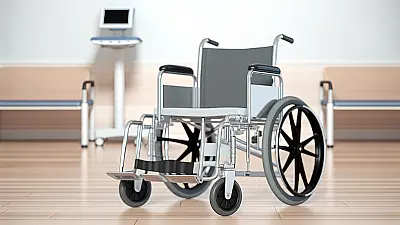NEW IBERIA, LA - State health inspectors found that Belle Teche Nursing & Rehabilitation Center violated federal regulations by failing to properly include a resident in care planning meetings and document participation, according to a May 21, 2025 inspection report that identified issues affecting resident rights and care coordination.

Care Plan Participation Denied Despite Federal Requirements
The investigation centered on a 68-year-old resident who had been living at the facility with multiple chronic conditions including polymyalgia rheumatica, osteoarthritis, and fibromyalgia. The resident, who uses a wheelchair for mobility, possessed full cognitive capacity according to assessment records, scoring 15 on the Brief Interview for Mental Status (BIMS) - a score indicating intact cognition and decision-making ability.
Despite federal regulations requiring nursing homes to involve residents in their care planning, the resident told inspectors on May 19, 2025: "I have not been invited to a care plan meeting." This statement triggered further investigation into the facility's care planning processes and documentation practices.
The facility's own policy, reviewed by inspectors and dated January 15, 2025, clearly stated that comprehensive care plans should be developed using input from "resident and family interviews, care conferencing and health care professional data." However, when questioned about the resident's participation, staff members could not produce evidence that proper procedures had been followed.
Documentation Failures Reveal Systemic Issues
When inspectors interviewed the Social Service Director on May 20, 2025, significant gaps in the facility's documentation emerged. The director acknowledged responsibility for notifying residents or their representatives about scheduled care plan meetings. According to the facility's stated procedure, residents who serve as their own representatives should receive hand-delivered letters inviting them to attend these meetings.
However, the Social Service Director admitted she "was unable to provide documentation to confirm that a letter was given to Resident #68" inviting participation in care planning. This documentation failure represents more than a simple paperwork error - it demonstrates a breakdown in the facility's system for ensuring resident involvement in their own care decisions.
The Clinical Care Coordinator, a Licensed Practical Nurse responsible for the resident's care plan, revealed additional documentation problems during an interview that same day. Despite a care plan meeting reportedly held on May 6, 2025, the coordinator could not provide any documentation identifying who attended the meeting or what decisions were made. Most notably, the facility had no sign-in sheet for staff, residents, or representatives to confirm attendance at care plan meetings.
Medical and Regulatory Implications
Care planning meetings serve as the cornerstone of individualized resident care in nursing facilities. These meetings bring together the interdisciplinary team - including nursing staff, therapists, dietary specialists, and social workers - to assess a resident's needs, establish care goals, and develop strategies to maintain or improve functional abilities. For residents with complex conditions like polymyalgia rheumatica, which causes muscle pain and stiffness, coordinated care planning becomes essential for managing symptoms and maintaining quality of life.
Federal regulations specifically mandate resident participation in care planning when cognitively able. This requirement recognizes that residents maintain the fundamental right to direct their own care decisions. When facilities exclude capable residents from these discussions, they violate not only regulatory standards but also basic principles of person-centered care that form the foundation of modern long-term care practice.
The absence of proper documentation compounds these violations. Without records of who attended meetings, what was discussed, and what decisions were made, facilities cannot demonstrate that they are meeting regulatory requirements or providing appropriate care. Documentation serves multiple critical functions: it ensures continuity of care across shifts, provides legal protection for both residents and facilities, and enables quality assurance reviews to identify areas needing improvement.
Industry Standards and Best Practices
Current industry standards emphasize the importance of resident engagement in all aspects of care planning. The Centers for Medicare & Medicaid Services requires facilities to develop comprehensive care plans within seven days of completing a resident's initial assessment. These plans must be reviewed and revised quarterly or whenever a resident's condition changes significantly.
Best practices dictate that facilities should maintain detailed records of all care planning activities, including written invitations to meetings, attendance logs, meeting minutes, and documentation of any resident or family input. Many facilities now use electronic systems to track these requirements and generate automatic reminders for scheduled meetings.
For residents with chronic pain conditions like fibromyalgia and osteoarthritis, involvement in care planning allows them to communicate their pain levels, identify effective interventions, and participate in decisions about pain management strategies. This collaboration between residents and care teams typically leads to better outcomes and higher satisfaction with care.
Additional Issues Identified
The inspection report classified this violation under federal tag F0657, which addresses comprehensive care planning requirements. The violation was categorized as causing "minimal harm or potential for actual harm" and affected few residents, suggesting this may have been an isolated incident rather than a widespread practice at the facility.
The facility's policy clearly outlined appropriate procedures for developing comprehensive care plans using multiple sources of information, including the Resident Assessment Instrument (RAI) and input from various healthcare professionals. However, the gap between written policy and actual practice highlights the need for improved staff training and accountability measures.
The inspection findings underscore the importance of robust quality assurance programs that regularly audit care planning processes and documentation practices. Facilities must ensure that all staff members understand their roles in the care planning process and maintain appropriate records to demonstrate compliance with federal regulations.
Full Inspection Report
The details above represent a summary of key findings. View the complete inspection report for Belle Teche Nursing & Rehabilitation Center from 2025-05-21 including all violations, facility responses, and corrective action plans.
💬 Join the Discussion
Comments are moderated. Please keep discussions respectful and relevant to nursing home care quality.